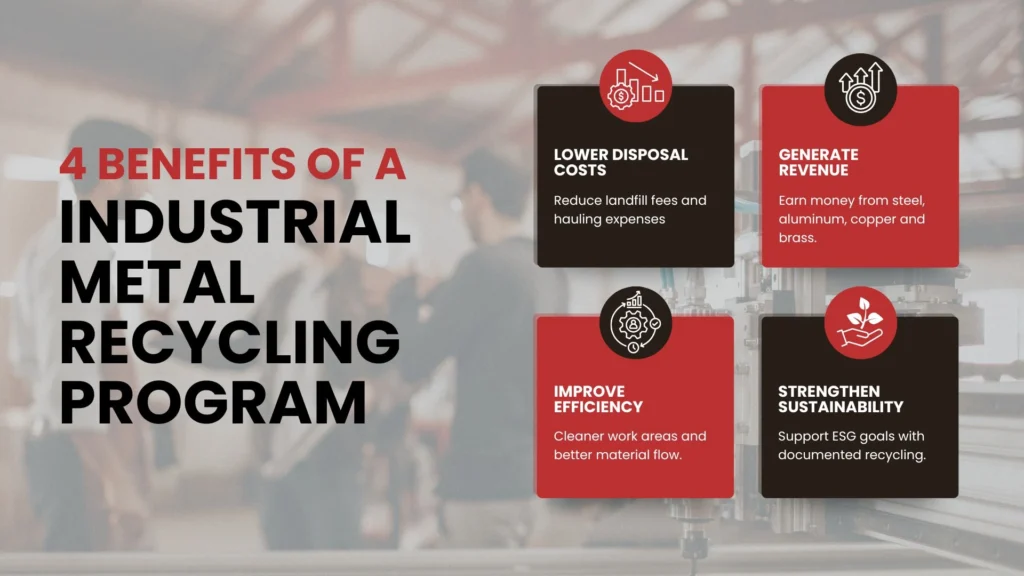Manufacturers face constant pressure to improve efficiency, reduce waste, and keep production costs under control. Whether you run a CNC shop, fabrication line, machine maintenance department, or full manufacturing operation, metal waste is part of everyday production. But with the right strategy, that waste becomes a valuable resource instead of an expense.
Industrial metal recycling helps manufacturers streamline operations, lower disposal and hauling fees, recover financial value from scrap, and strengthen sustainability programs that matter to customers and regulators. When metal recycling is built directly into production workflows, it can deliver long-term cost savings across the entire facility.
Iron & Metals has been helping Colorado manufacturers capture this value for more than 60 years. Especially now, efficient recycling has never been more important.

Metal-intensive operations generate scrap in many forms: turnings, shavings, cutoffs, stamping leftovers, defective parts, replaced machine components, and end-of-life equipment. If this material goes into a mixed-trash dumpster, manufacturers lose money twice: once through disposal costs and again through missed revenue.
A structured recycling process solves both problems by:
Scrap metal is heavy. When it’s tossed into general waste, landfill weight charges rise fast. Separating metal reduces:
These savings alone can be significant for busy facilities.
Manufacturers generate some of the most valuable scrap:
Clean, sorted scrap can generate meaningful monthly revenue — often enough to offset tool costs, maintenance budgets, or other operational expenses.
Organized recycling improves shop flow by reducing clutter around machines and minimizing cleanup time. Recycling helps keeps scrap away from production areas and maintains clear pathways for forklifts and workers. Having clean scrap collection points also makes material handling safer and more predictable.
Manufacturing customers increasingly request sustainability data or environmental commitments. Recycling supports:
Recycling metal uses far less energy than producing new material, and manufacturers can demonstrate these benefits directly.
Every manufacturing operation is different, but most facilities generate recyclable metals such as:
The key to maximizing value is sorting materials where feasible and keeping scrap clean.
Effective recycling goes beyond simply tossing scrap into a bin. The goal is to create a streamlined, cost-lowering workflow.
Well-placed collection bins reduce double-handling, wasted labor, and unnecessary cleanup. Operators can offload scrap immediately, keeping machines running longer.
When metal is separated early, less waste ends up in dumpsters — reducing costs and environmental impact.
Manufacturers who accumulate clean, sorted scrap often qualify for:
Iron & Metals offers competitive, market-based pricing for manufacturing scrap, especially aluminum, copper, and steel.
A clean, organized environment leads to faster setups, less downtime, fewer safety hazards, and better efficiency. CNC chips, in particular, build up fast. Removing them regularly prevents machine interference.
Manufacturers can improve recycling results significantly by implementing a few key steps:
Iron & Metals has decades of experience supporting Colorado’s manufacturing sector with fast, reliable, and fairly priced recycling services.
Manufacturers choose Iron & Metals for:
From one-man fabrication shops to full-scale industrial plants, we help manufacturers turn waste into recurring savings.
Industrial metal recycling is one of the simplest and most effective ways for manufacturers to reduce costs, improve efficiency, and strengthen sustainability efforts. With better sorting, cleaner processes, and a trusted recycling partner, scrap becomes an asset — not a challenge.
Iron & Metals makes industrial recycling straightforward, profitable, and tailored to your operation.
Let’s streamline your scrap handling and reduce your manufacturing costs, one container at a time. Contact us to learn more.